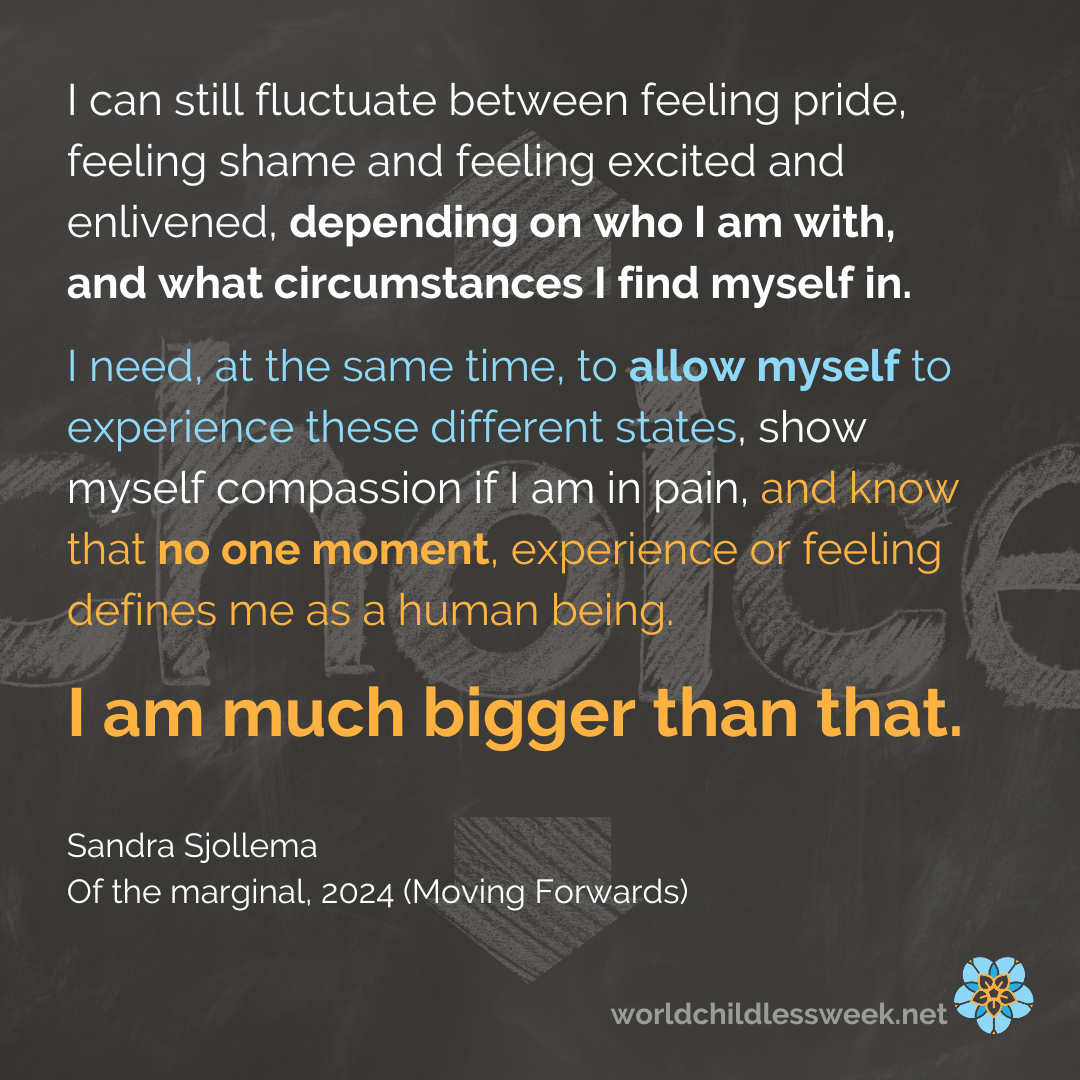Sandra Sjollema
Of the marginal
In her article about being single and childless, Wilkinson (2019) discusses two types of people who fall outside of the cultural norm of “reproductive futurism”, both of whom she describes as being “queer”, that is, out of place or out of sync with these norms.
The first type is the “anti-normative”, the one who is oppositional and defiant of social norms, who radically refuses them. The second is “non-normative” who, through circumstances, twists of fate, or simple preferences, is also outside of the “charmed circle of appropriate intimacy”, i.e., marriage and children.
The reason this article speaks to me as loudly as it does is because I have come to realize that the way I relate to my childlessness, divorced status and queerness have been shaped by both tendencies residing within, and by the tensions created by holding both.
On the one hand, I have always been a rebel. Even as a child. I drove my mother crazy with my defiant behaviour, for example, often asking her questions that showed I did not agree with her perspective, or by, as she put it “always having to get in the last word.” I also openly rejected social norms. Even as a ten-year-old, I was a budding feminist and saw that my mother’s job was often a hapless one, what with the non-stop drudgery of dishes, washing, housework and the like. I boldly declared, at that age, that I was never going to get married, that I was going to live with a woman and raise a child with said woman.
Everyone laughed: the precocious little girl would come around when she gets older.
Later in life, this rebelliousness and defiance would express themselves through activism, fights for social justice, and the questioning of a variety of social norms, including compulsory heterosexuality, coupledom and reproduction. These tendencies also expressed themselves in more flagrant ways, for example, through alcoholism and engaging in shoplifting and other misdemeanors. Finally, this rebelliousness manifested itself by proudly declaring myself pansexual and as not being interested in “performing femininity” (I have always been a tomboy) even though I still declare myself “she/her.”
On the other hand, from my childhood onwards, I have wanted to fit in, to have boyfriends, and to marry men (which I did, twice). At some point along the way, I decided that as a woman, I should want to have children. Whether any of these desires were truly heartfelt, or were constructed by family and society, is still up for debate.
In any case, I did try to have children, for several years, with two different men. But fate or circumstance would intervene, and it would not be possible.
My emotional responses to my current situation – not only divorced and childless but dealing with chronic illness and becoming elderly - depend on which part of me is speaking the loudest. The rebel, the defiant one within, is not upset about not having children, as it is yet another way that I don’t fit in, and don’t particularly want to. That part of me is proud of being outside the norms. American theorist and author hooks describe taking such a stance as “choosing marginality.”
If I am coming from the place of the one who wants social acceptance, but, through cruel fate and circumstance, or maybe a string of personal liabilities, cannot get it, then I can see myself as the social failure, the old cat lady, the strange, bizarre, weird one who missed the proverbial boat. These are but a few of a host of self-critical epithets, primarily spurred on by societal attitudes. This “nonconformity” is not by choice. The overwhelming sentiment from this point of view is shame.
In her article about the gay movement in the 1980’s Gould discusses the fact that in many marginalized communities, the back-and-forth between feeling pride and shame is common. And like it or not, the childless, and especially the childless and single, and maybe the divorced, are on the margins.
While I prefer the stance of “anti” or “oppositional” to letting circumstances drag me into a non-conformity that ultimately ends in self-judgment or resentment, I would like to believe there is another way to be of the marginal. In this sense, I like to entertain Butler’s ideas of the marginal, namely, that living on the margins can be a leeway into creativity and aliveness. This way, the marginal is no longer defined by what is not there in relation to the centre (i.e., being married and a parent) but by a beautiful tapestry of possibilities waiting for us to explore it. This sounds more than a little enticing and certainly worthy of exploration.
I do recognize, however, that to get to that third alternative, in my case anyway, was something I arrived at after several years of loss and disappointment, and even today, is not a given. I can still fluctuate between feeling pride, feeling shame and feeling excited and enlivened, depending on who I am with, and what circumstances I find myself in. I need, at the same time, to allow myself to experience these different states, show myself compassion if I am in pain, and know that no one moment, experience or feeling defines me as a human being. I am much bigger than that.
REFERENCES:
Butler, J. (1990). Gender Trouble: Feminism and the Subversion of Identity. London: Routledge.
Gould, D. B. (2009). Moving Politics: Emotion and Act Ups fight against AIDS. Chicago: The University of Chicago Press.
hooks, B. (1990). Yearning: Race, gender and cultural politics. Boston: South End Press.
Wilkinson, E. (2020). Never after? Queer temporalities and the politics of non-reproduction. Gender, Place & Culture, 27(5), 660-676.

